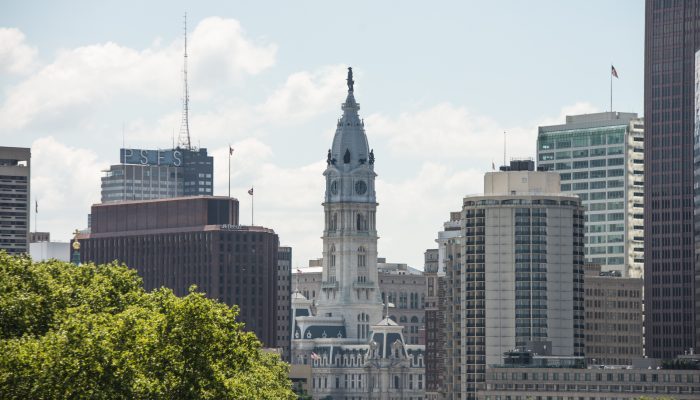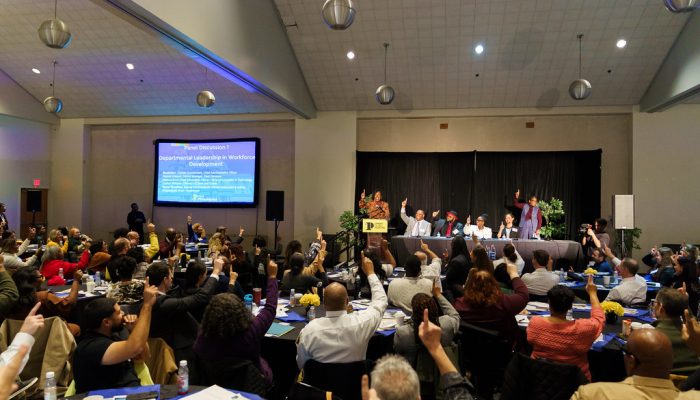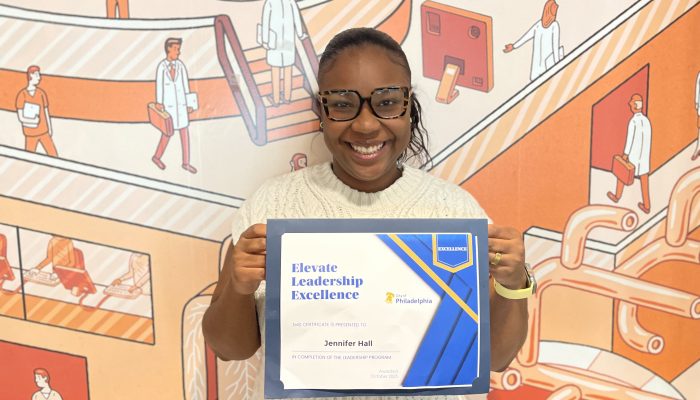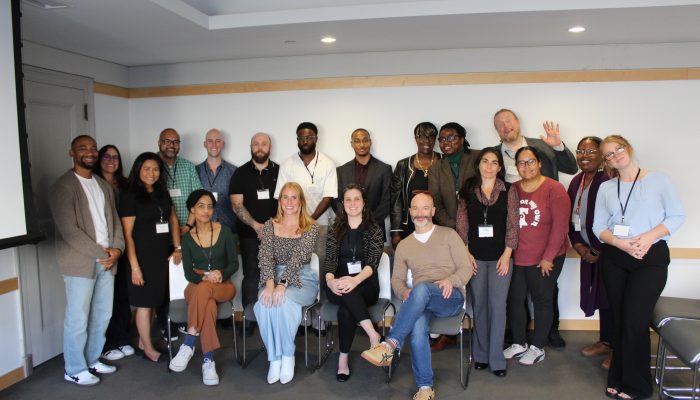In its first-ever grant cycle, the Operations Transformation Fund (OTF) has awarded 11 projects with funding. The OTF is a $10 million fund that will support transformative projects within City government for the next two fiscal years (2022 and 2023).
The OTF committee looked for innovative ideas that departments could bring to life over the next 18 months to transform City operations and services to benefit employees and residents.
A few key impacts include:
- Creation of 19 new City jobs;
- Transforming and digitizing important processes;
- Allocation of over $50,000 by four initiatives to pay residents for participating in focus groups, an advisory committee, and usability testing;
- Support for translation, interpretation, and American Sign Language (ASL) services; and
- Focus of three projects on increasing the diversity of the City’s workforce.
Equity, efficiency, and sustainability stood at the forefront when selecting the projects.
About the projects
The below projects will be brought to life through the OTF:
- Office of Human Resources and Human Resources and Talent: “Mobile and Neighborhood Library Civil Service Recruitment and Testing” ($676,500)
- This project will transform the Civil Service recruitment and testing process through a diverse, community-based outreach strategy. It will establish a mobile unit to conduct community-based and on-site recruitment and testing for civil service examinations. This will help recruit candidates from areas of the city that are underrepresented in the City’s civil service workforce and will support virtual testing. These mobile units will be located at local library branches and increase awareness about Civil Service opportunities, provide technology support and resources, and offer accessibility.
- Service Design Studio and Mayor’s Office of Civic Engagement and Volunteer Service: “Equitable Community Engagement Toolkit” ($549,200)
- The Equitable Community Engagement Toolkit is a City-wide initiative that will transform how the City of Philadelphia thinks about, plans for, and facilitates engagement with the communities it serves. It will be built through a collaborative effort that includes engagement with City practitioners, community groups, and community members who have been historically marginalized by government actions. It will create the conditions so equitable forms of engagement between the City and its communities can occur. The toolkit will be made up of several components, including guiding principles, guidance documents, templates, accountability strategies, training, a digital library, and more.
- Health and Human Services, Department of Behavioral Health and Intellectual disAbility (DBHIDS), Community Behavioral Health, and Philadelphia Department of Human Services: “Crisis Access Link Model” ($500,000)
- The Crisis Access Link Model (CALM) will provide increased behavioral health supports to youth and families in need by creating greater access to mental and behavioral health services for those at risk for or involved in the child welfare system. It also aims to reduce reliance on youth residential placement and stabilize youth in their communities. This model will utilize and expand the City’s children’s mobile crisis services. CALM is an outcome of the Youth Residential Placement Task Force report, which includes 19 recommendations.
- Office of Property Assessment (OPA): “Updating Property Size Data” ($500,000)
- This project will verify and update building square footage information contained in the Office of Property Assessment’s records and create or verify existing sketches that can be imported into its CAMA (Computer Assisted Mass Appraisal) system. Some square footage entries have not been verified in recent years and often, they are missing an associated sketch. Inaccurate data may cause property assessment values to reflect an incorrect fair market value. OPA aims to update the most valuable and critical datasets and to accurately evaluate properties in the City.
- Department of Records: “Public Safety Reports Online Portal” ($450,000)
- This project will create a public-facing online portal to deliver various public safety reports, replacing a series of processes that is currently almost entirely manual and paper-based. Public safety reports include police incident reports, fire reports and emergency medical services reports, and police department records check/letters of good conduct. The digital system will include supporting backend workflows to search, process payments, and deliver these reports to the public through a simple application and payment process.
- Office of Immigrant Affairs (OIA) and Office of Innovation and Technology (OIT): “Translation Services Expansion for Phila.gov” ($450,000)
- This project improves the translated content in the City’s website (Phila.gov). It will standardize the number of translated pages for consistency, accuracy, and availability of multilingual information. Additionally, the Office of Immigrant Affairs, OIA, and the Office of Innovation and Technology, OIT, will create a new process that ensures translations are checked for quality and enable departments to provide better translations for their content on Phila.gov. Overall, translation services will grow and become more standardized to offer a better experience of Phila.gov to multilingual residents.
- Office of Innovation and Technology: “Digital Forms” ($400,000)
- This project aims to ensure the City’s digital forms are accessible, secure, and consistent to streamline City processes and services. Forms are a key part of ensuring that the City delivers important services—both internally and for residents. OIT’s primary goals are to expand digital forms, reduce technical debt, close security gaps, and improve resident experience when interacting with city government.
- Department of Planning and Development and Department of Licenses and Inspection: “Analyzing the Actual Costs and Potential Benefits within the Development Pipeline” ($375,000)
- Philadelphia’s processes associated with planning and approving development are complicated. They do not always result in costs and benefits that are equitably distributed among the city’s residents, developers, businesses, and other stakeholders. This project will explore whether the City is devoting sufficient resources to support the planning and approval processes while advancing equitable growth in Philadelphia’s communities.
- Office of Transportation, Infrastructure, and Sustainability, Department of Streets, Department of Labor, and Department of Commerce: “Building Capacity for Infrastructure Project Delivery and Diverse Participation” ($318,000)
- This project will build the capacity for the Streets Department and partners in and outside of city government to deliver capital projects and related services. It will provide mentorship and training to a cohort of employees, identify bottlenecks in processes, streamline project delivery, and upgrade management technology and methods. By meeting these goals, the department will be able to prioritize projects based on equity, support accessibility, and create best practices for the workforce.
- Office of Sustainability: “Eastwick Strategic Planning and Alignment—A Place-Based Framework” ($261,000)
- The Office of Sustainability will develop and implement a strategic direction to enhance coordination between the 11 active City-sponsored initiatives focused on addressing environmental injustice taking place in Philadelphia’s Eastwick neighborhood. The development of a strategic framework is necessary to advance environmental justice for Eastwick. The goals of this project include aligning existing initiatives, identifying opportunities for collaboration, and creating performance metrics to measure progress. This process and framework can then be used to address issues of environmental injustice across the city.
- Office of Innovation and Technology: “OIT Apprenticeship Program” ($225,000)
- The Office of Innovation and Technology’s Apprenticeship Program is a career change opportunity for current City employees to receive training and mentorship in Software Engineering and User Experience as they begin a new career in these high-tech fields. The program will provide a paid training bootcamp for selected applicants as the start of the two-year apprenticeship. The apprenticeship will support skill-building, provide mentorship, and open the door to a variety of mid-level roles in the technology industry. This initiative is designed to address inequity in—and strengthen—OIT’s workforce.




